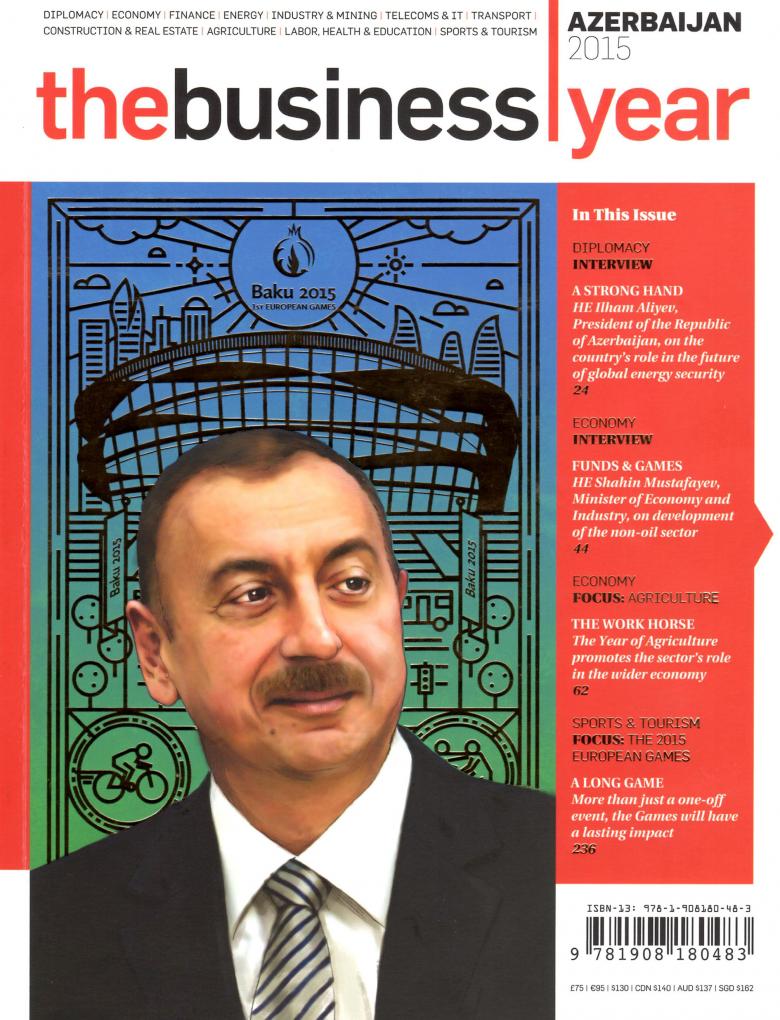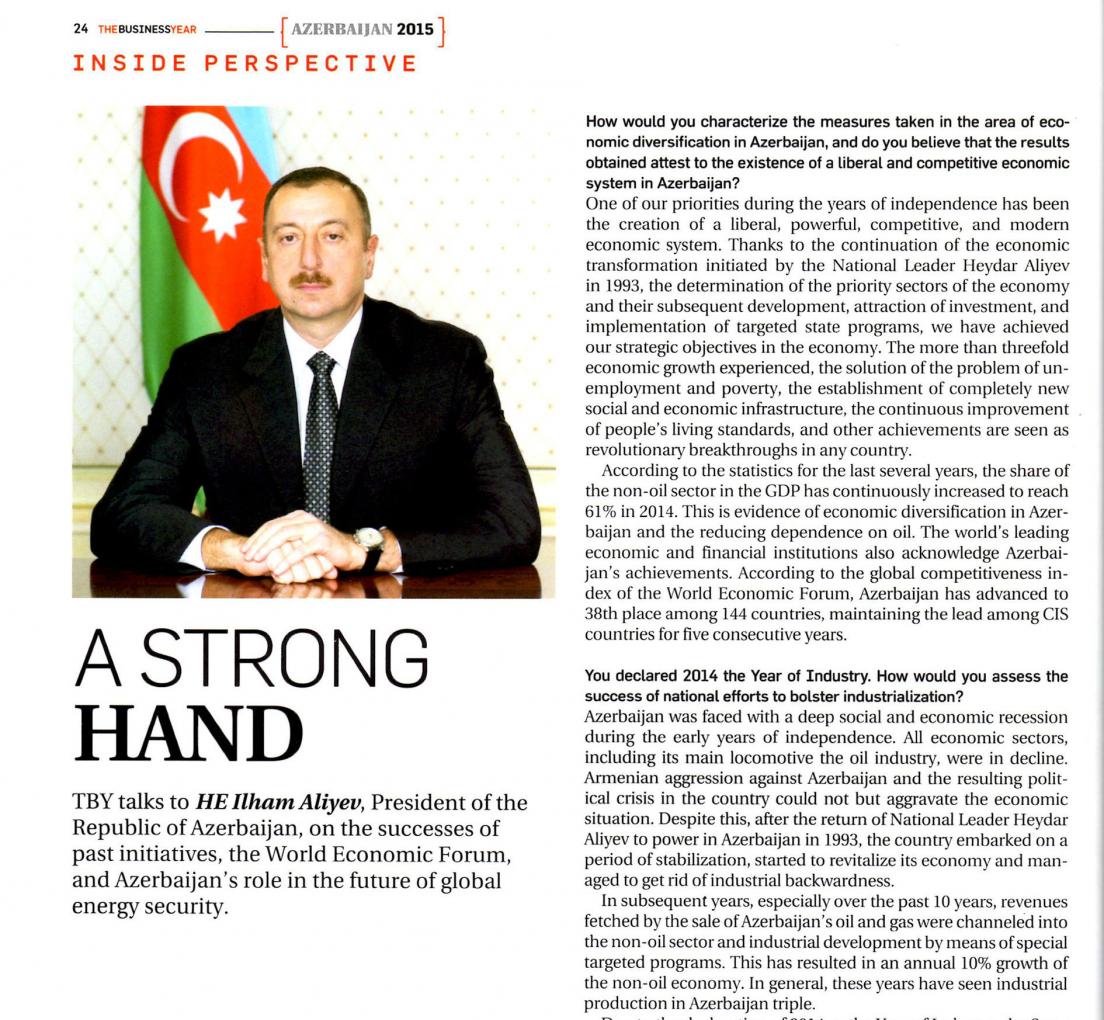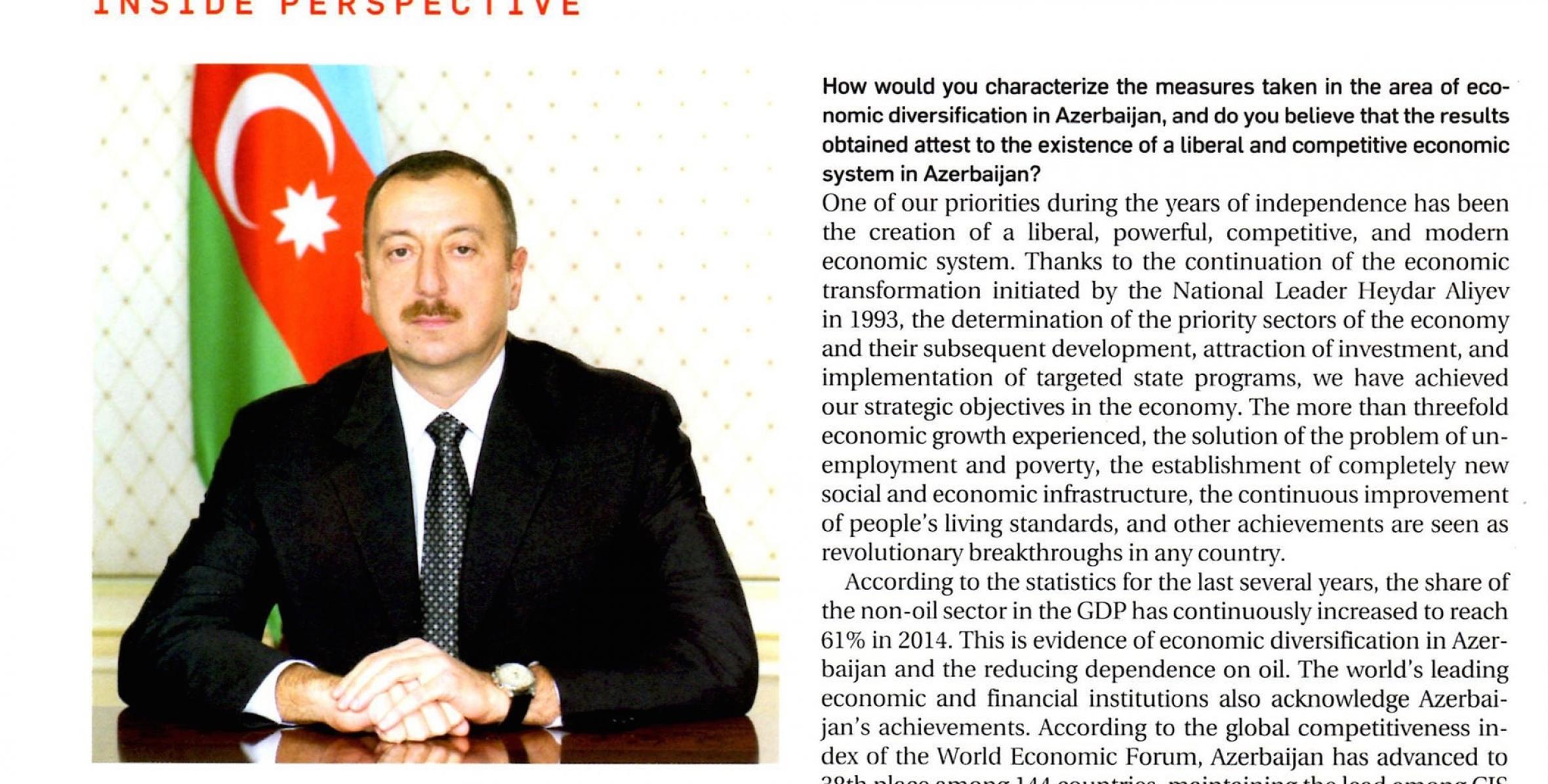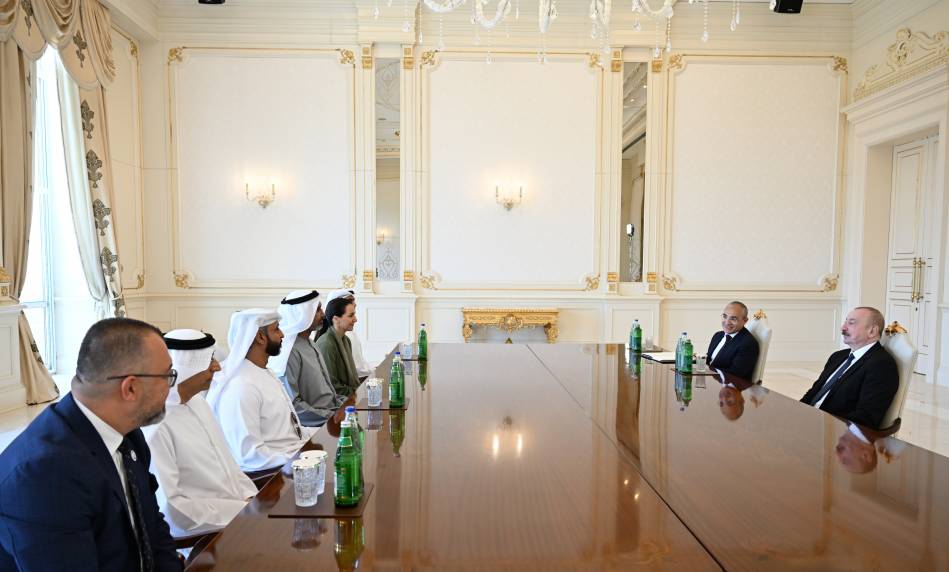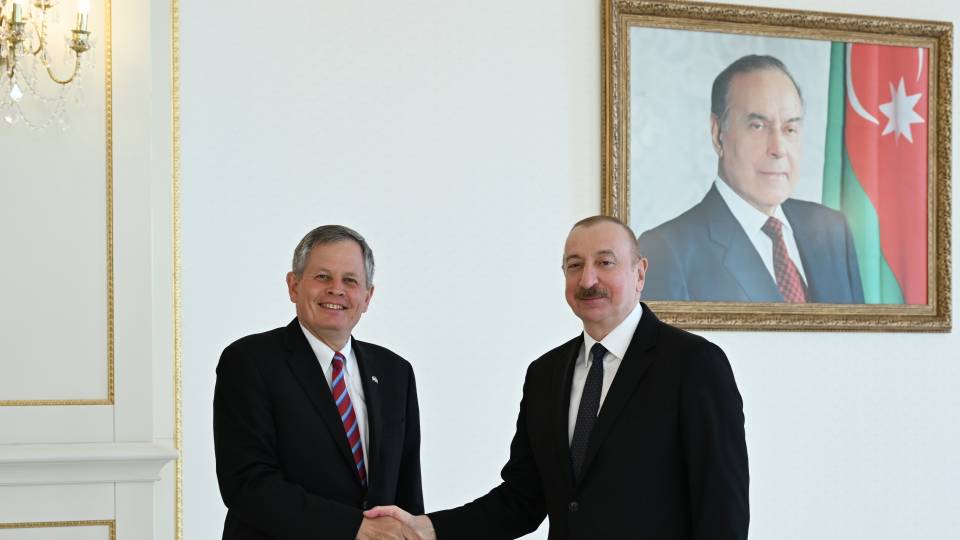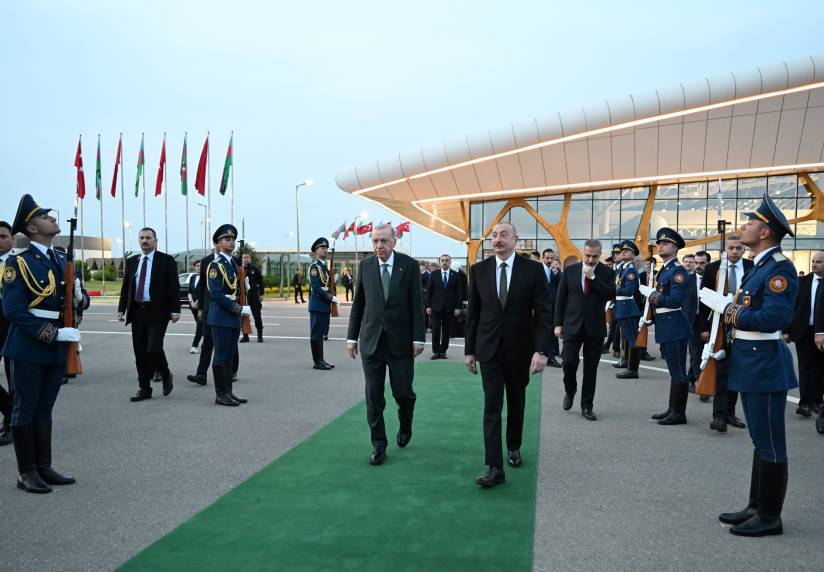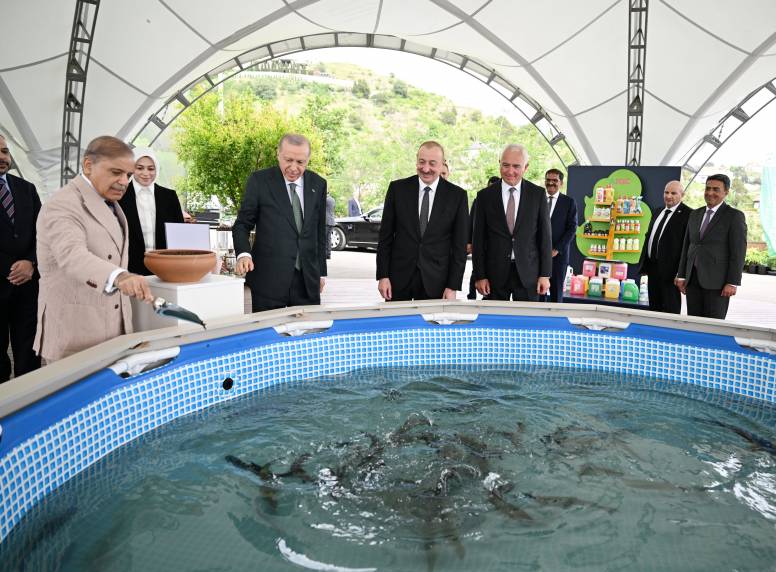A special edition of the “The Business Year” magazine highlighting Baku 2015 first European Games features an interview with President of the Republic of Azerbaijan Ilham Aliyev.
How would you characterize the measures taken in the area of economic diversification in Azerbaijan, and do you believe that the results obtained attest to the existence of a liberal and competitive economic system in Azerbaijan?
One of our priorities during the years of independence has been the creation of a liberal, powerful, competitive, and modern economic system. Thanks to the continuation of the economic transformation initiated by the National Leader Heydar Aliyev in 1993, the determination of the priority sectors of the economy and their subsequent development, attraction of investment, and implementation of targeted state programs, we have achieved our strategic objectives in the economy. The more than threefold economic growth experienced, the solution of the problem of unemployment and poverty, the establishment of completely new social and economic infrastructure, the continuous improvement of people’s living standards, and other achievements are seen as revolutionary breakthroughs in any country.
It is true that the energy sector is still the key driving force of the Azerbaijani economy. However, by channeling a portion of our revenues from the production and sale of hydrocarbons into the development of the non-oil sector, we have both revitalized our traditional sectors of the economy and developed such spheres as ICT, tourism, space industry, defense industry, and others. According to the statistics for the last several years, the share of the non-oil sector in the GDP has continuously increased to reach 61% in 2014. This is evidence of economic diversification in Azerbaijan and the reducing dependence on oil.
The world’s leading economic and financial institutions also acknowledge Azerbaijan’s achievements. According to the global competitiveness index of the World Economic Forum, Azerbaijan has advanced to 38th place among 144 countries, maintaining the lead among CIS countries for five consecutive years.
You declared 2014 the Year of Industry. How would you assess the success of national efforts to bolster industrialization?
Azerbaijan was faced with a deep social and economic recession during the early years of independence. All economic sectors, including its main locomotive the oil industry, were in decline. Armenian aggression against Azerbaijan and the resulting political crisis in the country could not but aggravate the economic situation. Despite this, after the return of National Leader Heydar Aliyev to power in Azerbaijan in 1993, the country embarked on a period of stabilization, started to revitalize its economy and managed to get rid of industrial backwardness.
In subsequent years, especially over the past 10 years, revenues fetched by the sale of Azerbaijan’s oil and gas were channeled into the non-oil sector and industrial development by means of special targeted programs. This has resulted in an annual 10% growth of the non-oil economy. In general, these years have seen industrial production in Azerbaijan triple.
Due to the declaration of 2014 as the Year of Industry, the State Program on Industrial Development of the Republic of Azerbaijan covering 2015-20 has been adopted and measures have been taken to modernize the structure of the economy, enhance the export potential of the non-oil industry, expand competitive, knowledge-intensive, and innovative productions, and train qualified professionals in new manufacturing sectors.
As part of the Year of Industry, around 200 enterprises, including more than 40 medium and large companies, have been created. The ICT sector is developing rapidly these days. There is a permanent focus on the development of this sector. The fact that 2013 was declared the Year of Information and Communication Technologies is clear evidence of that. It is no coincidence that on February 8, 2013, our country witnessed a historic event in the launch of Azerspace-1 into orbit. Thus, Azerbaijan has joined the club of space-faring nations. The handover of Azerbaijan’s second satellite “Azersky” to Azerkosmos OJSC in December of last year attests to the importance our country attaches to the development of knowledge-intensive sectors of the economy.
Our industrialization policy highlights the development of the national military and industrial complex as a priority area. Our armed forces already rely on domestic production for a number of arms and munitions. Our military products are displayed in international exhibitions. In fact, we have completed initial sales with the aim of exports. We commissioned the Baku Shipyard in 2013, as our country has already started the production of vessels for petroleum operations, tankers and cargo vessels. The Baku Shipyard is also capable of addressing the needs of other regional countries in this area.
By and large, we see non-oil sector development as an opportunity to address domestic needs and enhance our export potential. There is a great demand for Azerbaijani agricultural produce in our traditional markets. At the same time, we are exploring ways of accessing new markets. The same approach applies to the production of building materials. We have already fully provided the country’s construction sector with cement. The largest cement plant commissioned in Azerbaijan in 2014 has completely eliminated our dependence on imports. At the same time, it has created export opportunities. We are also developing aluminum, steel, and metallurgy enterprises. The process of establishing industrial clusters will continue in the future too, because there are sufficient raw materials and the necessary industrial potential in Azerbaijan.
Measures continue to be taken to develop chemical, knitting, and metallurgy sectors in Sumgait, Mingachevir, and Ganja, respectively. These cities have amassed extensive experience in the said areas. Sumgait has become the second largest industrial center not only of Azerbaijan, but also of the entire South Caucasus. The establishment of new industrial centers in Azerbaijan is now in full swing. The potential, the material resources, the qualified professionals, and, most importantly, the political will required for the implementation of our plans are all available.
What further steps have been taken to increase the ease of doing business and investing in Azerbaijan?
More than $180 billion have been invested in the Azerbaijani economy over the past 11 years. This is the result of the stability and a normal business environment in the country. In 2014 alone, $27 billion was invested in the economy, including $11 billion of foreign investments. This attests to the fact that Azerbaijan remains an attractive country for foreign investors. The attraction of such a large volume of investments can be regarded as a major success for any country.
On March 3rd, 2014, an executive order on additional measures toward entrepreneurship development was signed with the aim of improving state regulation of business and creating a favorable business landscape in the country. We are taking consistent measures to further improve the business environment, create a sound competition, simplify the procedures for starting a business, enhance state support for private enterprise, modernize corporate governance, and protect investor interests.
It is no coincidence that our achievements in private enterprise development have drawn the attention of international economic and financial institutions. According to the World Bank’s Doing Business 2015 Report, Azerbaijan is among the world’s top 10 reformist countries. Azerbaijan is ranked in 10th in the world for ease of immovable property registration and 11th for starting a business.
The Economic Freedom Index-2014 report jointly prepared by the Heritage Foundation and Wall Street Journal lists Azerbaijan in 81st place among 186 countries in terms of economic freedom. The macroeconomic stability, the sustainable development of the non-oil sector, the presence of a strong financial potential, a sound competition, and a favorable investment environment gives both foreign investors and local business people further confidence of the future.
At the World Economic Forum in Davos, you and other world leaders discussed the New Global Context. You also addressed a session called a new global context on energy geopolitics. What does this new context imply for Azerbaijan?
Starting from 2008, the World Economic Forum has mainly been discussing ways out of the economic and financial recession. This year’s anniversary session of the Forum called New Global Context focused on development and stability, cooperation in eliminating crises and their implications, society and security, innovation, and other issues. The primary objective of such discussions and opinion exchanges against the backdrop of global political and economic cataclysms is to determine and promote a new model of coexistence that would pave the way for development, progress, and mutually beneficial cooperation. We are living in a region prone to tensions, conflict, threats, and terrorism; however, mutually beneficial cooperation is possible when the situation outside the country is more or less predictable. Therefore, the policies and the gigantic transnational projects Azerbaijan is implementing are aimed at creating a more predictable environment in the region and beyond. Azerbaijan plays an active part in the establishment of regional transport corridors and modern transport infrastructure. Both East-West and North-South transport corridors pass through Azerbaijan. As a result of the commissioning of the Baku-Tbilisi-Kars railway in 2015, Azerbaijan will also become a country linking Europe with Asia.
The largest trade seaport in the Caspian basin is being built in Azerbaijan. Phase I of the new Baku International Trade Seaport, and the ferryboat terminal, were commissioned in Alat last year. We expect to fully launch the seaport in the next two years. The seaport will have a capacity to process 25 million tons of cargo and 1 million TEUs. This will significantly contribute to increasing the volume of cargo transportation in the Caspian. Special importance is attached to the development of air transport. A new terminal building of Heydar Aliyev International Airport has been built and commissioned. A total of six airports have been built in the regions, including four international ones. This brings the total number of international airports in the country to five. Azerbaijan is on its way to becoming a regional hub both in terms of cargo and passenger transportation.
In addition to contributing to the prosperity of the Azerbaijani people, the energy projects being implemented under Azerbaijan’s leadership also serve European energy security. The Southern Gas Corridor, which we are also working on, will play a crucial role in ensuring the energy security of Europe. As is evident, our transportation and energy projects play the role of a bridge between Europe and Asia, and contribute to the development of mutually beneficial cooperation against the backdrop of complex geopolitical processes. Azerbaijan is also heavily involved in the fight against global threats, including terrorism. We are a member of the International Anti-Terror Coalition. One of the two issues Azerbaijan tabled during its chairmanship in the UN Security Council was the fight against terrorism. After all, Azerbaijan has been faced with various manifestations of terrorism itself. More than 30 acts of terror have been committed against Azerbaijan by Armenia at different times, killing more than 2,000 of our people.
Azerbaijan aspires to resolve the Armenian-Azerbaijani conflict over Nagorno-Karabakh and other similar conflicts in accordance with international law. We have been subjected to Armenian aggression for more than 20 years. Unfortunately, the double standards existing in the world and an equal treatment of the aggressor and the victim do not facilitate conflict settlement. I believe that all conflicts in post-Soviet republics, and indeed elsewhere in the world, should be approached from the same angle because if one conflict remains unresolved, this sets a precedent for other conflicts. As was mentioned at the Forum, we are at a crossroads in 2015; there is a road leading to discrimination, fundamentalism, hatred, and mutual accusations, but there is also a road to solidarity and cooperation. Azerbaijan’s model of development, cooperation, and integration can lay the groundwork for the predictability of political and economic processes and protection of common interests.
The first gas supplies from the Caspian Sea to Europe via the Southern Gas Corridor are due to begin in 2019. In light of this, how do you see Azerbaijan’s role in the future of global energy security?
When the Baku-Tbilisi-Ceyhan (BTC) oil pipeline was put into operation in 2006, we took an important step in contributing to the energy security of Europe. The oil from Azerbaijan currently accounts for 30-40% of the energy balance of some European countries. The projects Azerbaijan has initiated over many years have also contributed to the realization of the Southern Gas Corridor. Azerbaijan has been working hard for 20 years to deliver its energy resources to world markets. We have a diversified transportation infrastructure. The Southern Gas Corridor is currently the largest infrastructure project in Europe, while Azerbaijan is the only new source of energy for Europe for the time being. This project consists of several components. The development of the Shah Deniz-2 gas field, the expansion of the South Caucasus Pipeline linking Azerbaijan with Georgia, the Trans-Anadolu Pipeline (TANAP), and the Trans-Adriatic Pipeline (TAP) are all constituent parts of the Southern Gas Corridor. Azerbaijan has proven gas reserves of 2.6 trillion cubic meters, while the volume of predicted reserves is twice as high. Our diversified infrastructure allows us the opportunity to increase our gas exports in any direction. Work is currently under way on the construction of the Southern Gas Corridor in all directions. The groundbreaking ceremony of the Southern Gas Corridor was held in Baku on September 20, 2014. This date is very symbolic because the Contract of the Century, which transformed the energy map of the region, and was also signed 20 years ago on this date. A meeting of the Advisory Council of countries represented in the Southern Gas Corridor was held in Baku in February 2014. It was an important step in coordinating future work. The groundbreaking ceremony of the TANAP pipeline held in Kars, Turkey, on March 17, 2015, which was attended by the presidents of Azerbaijan, Turkey, and Georgia, as well as representatives of the EU and the US, is also of tremendous importance to the implementation of the Southern Gas Corridor.
In addition to giving a second wind to Azerbaijan’s oil strategy, Shah Deniz-2 and the Southern Gas Corridor projects will also redraw the world’s energy map and create a new panorama in the area of European energy security. After all, the Southern Gas Corridor will lay the foundation for a new cooperation format in Eurasia. Initially, we created a trilateral cooperation format, the format of strategic energy, transportation, political, and economic partnership involving Turkey, Georgia, and Azerbaijan. It is now asserting itself as a tangible regional factor. The recent joining of this format by Greece, Albania, and Italy will further reinforce it. At the same time, Bulgaria, which is involved in the Nabucco project, is also taking part in our project now. Romania and Hungary are considering this option as well. We would like to deliver Azerbaijan gas to other Balkan countries as well. We believe that we can cooperate with these countries both as consumers and transit states. Therefore, the countries joining the new cooperation format are also becoming natural allies; thus, contributing to the emergence of a serious alliance in Eurasia. This will have tremendous implications both politically and economically. This having been said, we can state that the Southern Gas Corridor is not just an energy project or a pipeline; it is a serious political initiative.
Azerbaijan will host first European Games in June 2015. What unique attributes does Baku bring to the table as the inaugural host city, and what impact will the Games have on Azerbaijan?
The fact that we will host the first European Games is a manifestation of the great confidence placed in us, but it also puts tremendous responsibility on our shoulders. We also see the Games as evidence of great international interest in Azerbaijan. The dynamic development of Azerbaijan over the past 10 years, our achievements is all spheres of public life, and the independent policies we pursue in the international arena have enhanced our authority on a global scale. At the same time, as a result of the immense construction and landscaping work we have carried out, Baku has turned into one of the most beautiful cities in the world. I am sure that Baku will impress its visitors and athletes during the Games. Azerbaijan is also an active member of the international Olympic movement. Our athletes are winning a growing number of international tournaments each year. Most Azerbaijan districts now have Olympic centers meeting the most stringent requirements. Other sports facilities have also been built throughout the country. This is another factor contributing to the popularization of sport in Azerbaijan.
Azerbaijan has gained extensive experience in playing host to numerous international and regional sporting events. Baku has successfully hosted a number of high profile political, economic, humanitarian, sporting, and other international events. The First European Games to be held in Baku from June 12th to 28th will bring together more than 6,000 athletes from 49 countries who will compete in 20 sports. We intend to conduct the Games at the level of Summer Olympic Games. A strong international team comprising representatives of more than 40 countries has been established with support from the International Olympic Committee, and preparations for the Games are already in the final stages. Extensive work has been carried out to create a modern sporting infrastructure. The construction of most of the future venues of the Games have either already been completed or is nearing completion. In total, the Games will be conducted in 21 sports facilities in Baku. In addition to the 68,000-seat Baku Olympic Stadium, which will host the opening ceremony of the Games, an Olympic village of 7,300 people is being prepared for the Games. The transport infrastructure of the capital city has been overhauled, security measures taken, and serious attention paid to welcoming, accommodation, and training of visiting athletes.
I am convinced that the European Games will also be instrumental in promoting different sports in Azerbaijan and giving rise to a generation of athletes. At the same time, the Games will have a tremendous social impact on the country. Two-thirds of Azerbaijan’s population is below 35 years of age, and this large segment will be introduced to the values promoted by sport. The infrastructure put in place in the run-up to the European Games will pave the way for conducting other prestigious international and regional sporting events in the country. In 2016, Azerbaijan will play host to the World Chess Olympiad. Also, the Formula 1 Grand Prix will be held in Baku for the first time in the history of this region. In 2017, Baku will host the Islamic Solidarity Games.
The fact that both European Games and Islamic Solidarity Games will be held in one and the same country and city in a matter of two years is of a huge symbolic nature. Azerbaijan is a multi-confessional and multicultural country where representatives of all religions live in peace and prosperity like one family. Azerbaijan is making a contribution to the very relevant dialogue between civilizations. I also believe that the Games will also be of great help in promoting the Azerbaijan brand from the standpoint of its multiculturalism traditions and tourism opportunities. In other words, we have powerful potential and sophisticated sports infrastructure. We have amassed extensive experience in conducting major events; therefore, I am absolutely sure that we will conduct the Games at the highest level. Baku-2015 will open a new interesting page in the history of sport. The Baku Games will also set the standard for subsequent European Games, to be held every four years.
Azerbaijan’s growing prominence on the world’s stage has been marked by the country’s active foreign policy. What would you consider to be the milestones of Azerbaijan’s foreign policy in 2014, and what are the priority areas for 2015?
The Azerbaijani state conducts a diverse and balanced foreign policy. We are successfully integrating into the international world. We have built bilateral and multilateral relations with countries of the world on the basis of mutual respect and cooperation. Our strong potential enables us to conduct a fully independent foreign policy based on our national interests. In addition to being the leading state of the region, Azerbaijan is becoming a factor to be reckoned with on a global scale. We have a say in the solution of a number of international issues.
Last year was quite successful for Azerbaijan from the standpoint of its foreign political priorities. Our country has significantly reinforced its international standing and expanded its relations with the organizations we are a member of, as well as with many countries around the World. In the six months of our presidency in the Committee of Ministers of the Council of Europe, Azerbaijan identified the fight against corruption, democracy, human rights, security, and the inter-religious dialogue as its top priorities and put forward number of effective initiatives.
The ASAN xidmet service centers serves as an excellent example of Azerbaijan’s institutional reform in the fight against corruption. Currently, ASAN xidmət centers provide 30 legal and 32 various functional services. Since being launched on December 29th, 2012, ASAN xidmet centers have provided services to more than 4.12 million people. There is a great international interest in ASAN xidmet, which is an Azerbaijani brand name. It is no coincidence that a number of senior government officials from different countries familiarized themselves with the activities of ASAN xidmet centers while visiting Azerbaijan.
The appointment of a rapporteur on the Armenian-Azerbaijani conflict over Nagorno-Karabakh to facilitate communication of objective information about Azerbaijan to the world is one of our greatest achievements in the period of our presidency in this prestigious organization. The session of the OSCE Parliamentary Assembly held in Baku in June 2014 adopted a declaration reaffirming the principles of inviolability of borders and territorial integrity. By pursuing a completely independent policy, Azerbaijan has earned itself great authority worldwide. In 2012, Azerbaijan was one of the 10 countries invited to the G20 summit in Mexico, being the only country in the CIS to do so. In 2011-12, with the support of 155 countries Azerbaijan was elected as a non-permanent member of the UN Security Council and presided over this supreme body for two months. Azerbaijan has been invited to attend the G20 summit in Turkey in 2015 as well.
Azerbaijan’s foreign policy is conducted on the basis of a clear-cut strategy. In the years ahead, we are determined to continue pursuing our foreign political course, secure the sovereign rights of the Republic of Azerbaijan, protect our national interests, facilitate the development of bilateral and multilateral relations with other countries, resolve the Armenian-Azerbaijani conflict over Nagorno-Karabakh in accordance with international law and on the basis of the country’s territorial integrity, continue the implementation of gigantic transnational energy projects that represent tremendous importance for the region and Europe, and pay attention to other significant issues.
